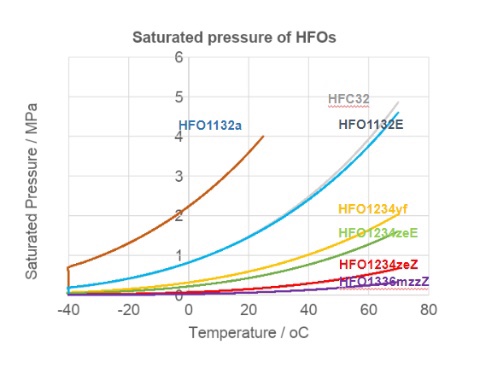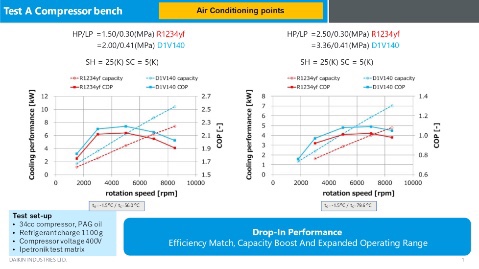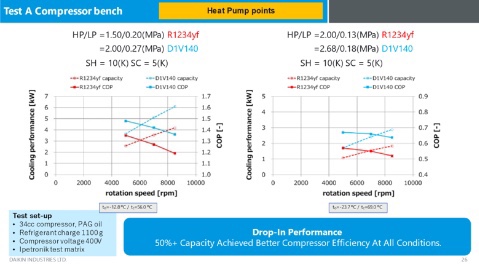


Daikin: The whole picture of the new refrigerant for EV!
– Mass production of refrigerants for EVs air conditioners –
-Improved heating performance at low outside temperatures-
Daikin Industries:
In 2027, we will start mass production of refrigerants for air conditioners equipped with EVs.
We will invest more than 10 billion yen to build a mass production plant at Kashima Factory.
Commissioning of the test plant:
A test plant will also be operational in 2024.
Be the first in the industry to commercialize refrigerants for EVs.
Daikin’s new refrigerant for EV:
It is characterized by “improved heating performance at low outside temperatures”.
Reducing the use of electric heaters:
To suppress the use of an electric heater with large power consumption.
The cruising range of EVs can be extended by up to 50%.
EV heating efficiency:
If the vehicle is equipped with an engine, the waste heat can be used for heating.
However, the heating efficiency of an EV depends on the performance of the car’s air conditioner.
Conventional refrigerant “R1234yf”:
It is unavoidable to use an electric heater with large power consumption.
Cruising distance in winter was a problem.
Developed R474A:
A mixture of R1234yf and newly developed refrigerant HFO1132 (E)
2022,
– Equivalent to international standards and ISO certification –
Registered as “R474A” with the American Society of Heating, Refrigerating and Air-Conditioning Engineers (ASHRAE).
new switch
Daikin : Tout le tableau du nouveau réfrigérant pour EV !
– Production en série de fluides frigorigènes pour véhicules électriques et climatiseurs –
-Amélioration des performances de chauffage à basses températures extérieures-
Daikin Industrie :
En 2027, nous lancerons la production de masse de fluides frigorigènes pour les climatiseurs équipés de véhicules électriques.
Nous investirons plus de 10 milliards de yens pour construire une usine de production de masse à l’usine de Kashima.
Mise en service de l’installation d’essai :
Une usine test sera également opérationnelle en 2024.
Soyez le premier de l’industrie à commercialiser des réfrigérants pour véhicules électriques.
Le nouveau réfrigérant de Daikin pour EV :
Il se caractérise par “une amélioration des performances de chauffage à basse température extérieure”.
Réduire l’utilisation des radiateurs électriques :
Pour supprimer l’utilisation d’un radiateur électrique à forte consommation d’énergie.
L’autonomie des véhicules électriques peut être étendue jusqu’à 50 %.
Efficacité de chauffage EV :
Si le véhicule est équipé d’un moteur, la chaleur perdue peut être utilisée pour le chauffage.
Cependant, l’efficacité de chauffage d’un VE dépend des performances du climatiseur de la voiture.
Réfrigérant conventionnel “R1234yf”:
Il est inévitable d’utiliser un radiateur électrique à forte consommation électrique.
La distance de croisière en hiver était un problème.
Développé R474A :
Un mélange de R1234yf et de réfrigérant nouvellement développé HFO1132 (E)
2022,
– Équivalent aux normes internationales et à la certification ISO –
Enregistré sous le nom “R474A” auprès de l’American Society of Heating, Refrigerating and Air-Conditioning Engineers (ASHRAE).
nouvel interrupteur
Daikin: Das Gesamtbild des neuen Kältemittels für Elektrofahrzeuge!
– Massenproduktion von Kältemitteln für Elektrofahrzeuge und Klimaanlagen –
-Verbesserte Heizleistung bei niedrigen Außentemperaturen-
Daikin-Industrien:
2027 werden wir mit der Massenproduktion von Kältemitteln für Klimaanlagen mit Elektrofahrzeugen beginnen.
Wir werden mehr als 10 Milliarden Yen investieren, um eine Massenproduktionsanlage in der Kashima Factory zu bauen.
Inbetriebnahme der Versuchsanlage:
Auch eine Testanlage wird 2024 in Betrieb gehen.
Seien Sie der Erste in der Branche, der Kältemittel für Elektrofahrzeuge kommerzialisiert.
Das neue Kältemittel von Daikin für Elektrofahrzeuge:
Es zeichnet sich durch „bessere Heizleistung bei niedrigen Außentemperaturen“ aus.
Reduzierung des Einsatzes von Elektroheizungen:
Die Verwendung einer elektrischen Heizung mit großem Stromverbrauch zu unterdrücken.
Die Reichweite von Elektrofahrzeugen kann um bis zu 50 % erweitert werden.
EV-Heizeffizienz:
Wenn das Fahrzeug mit einem Motor ausgestattet ist, kann die Abwärme zum Heizen genutzt werden.
Die Heizeffizienz eines Elektrofahrzeugs hängt jedoch von der Leistung der Klimaanlage des Fahrzeugs ab.
Konventionelles Kältemittel „R1234yf“:
Es ist unvermeidlich, eine elektrische Heizung mit großem Stromverbrauch zu verwenden.
Die Reisedistanz im Winter war ein Problem.
Entwickeltes R474A:
Eine Mischung aus R1234yf und neu entwickeltem Kältemittel HFO1132 (E)
2022,
– Entspricht internationalen Standards und ISO-Zertifizierung –
Registriert als „R474A“ bei der American Society of Heating, Refrigerating and Air-Conditioning Engineers (ASHRAE).
neuer Schalter
Next Gen Refrigerant
The market need for a new refrigerant:
Environmental Impact: GWP <1 to meet US AIM and EU F-Gas global warming reduction goals
Safety: Comparable to 1234yf, Suitable for use in the cabin
Performance: Pressure suitable for direct expansion system in wide temperature range Higher capacity and the ability to heat the passenger and battery at ambient temperature of -30°C (-22°F)
Daikin’s Unique Molecule
Daikin has developed a new and unique molecule, HFO-1132(E), with a GWP of <.004 Physical Properties Close To R32, an Ideal Component For A2L Blends.
The First And Only Medium Pressure HFO To Be Commercialized and ASHRAE Listed
– Daikin America
https://daikin-america.com/next-gen-refrigerant/
ASHRAE approves Daikin refrigerant as R474A
USA: A new Daikin refrigerant announced last year as a more efficient alternative to R1234yf in electric vehicles
has been designated as R474A by ASHRAE and given an A2L classification.
The new gas was developed
to reduce the energy draw of the heating and cooling systems in electric vehicles and thus improve the vehicles’ range.
It blends R1234yf with 23% of a new hydrofluoro-olefin refrigerant HFO1132(E),
which ASHRAE has now also separately approved and designated R1132(E) with a B2 safety rating.
It is said to possess a GWP below 1.
Unlike conventional internal combustion-engined vehicles,
in winter electric vehicles cannot use the engine waste heat for heating the interior and must draw the power from the battery.
Previous research is said
to have shown that the capacity of a R1234yf vehicle heat pump system reduces by up to 40% when the ambient temperature drops from 0℃ to -10℃.
This is recognised
as a significant problem in colder climates by motor manufacturers.
Initial tests are said
to have shown that the refrigerant provides good performance for heat pump function in electric vehicles in cold regions and good cooling performance in warm climates.
Daikin holds a number of patents on R1132(E),
for both its production and its application in a variety of different blends, including R474A.
HFO1132(E) is one of three possible forms, or isomers, of the chemical difluoroethylene.
All possess the same chemical composition, but are differentiated by their arrangement of atoms.
The others are HFO1132(Z) and R1132a, a refrigerant recently registered with ASHRAE by Koura.
– Cooling Post
https://www.coolingpost.com/world-news/ashrae-approves-daikin-refrigerant-as-r474a/